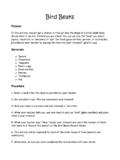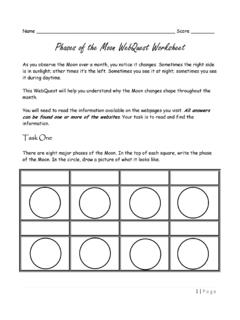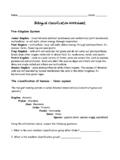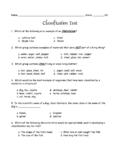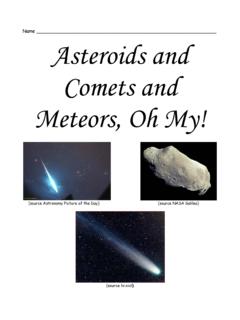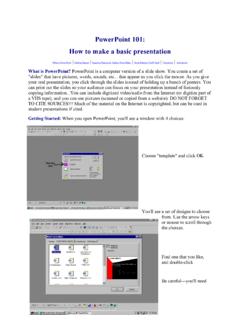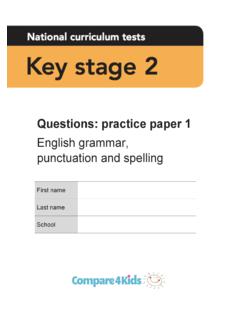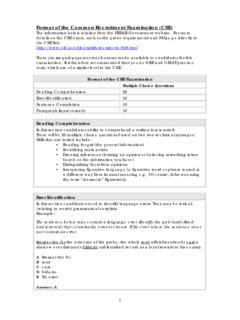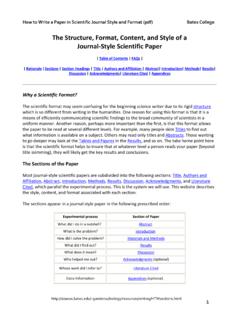Transcription of Required Vocabulary - mrscienceut.net
1 Name _____ Required Vocabulary Analyze Review the data from an experiment to find out what they mean. Assumption Something that is believed to be true without proof. Compare Look at to find similarities and differences. Conclusion (Conclude) - The summary of an experiment, based on data. Control A part of the experiment that is different from the experiment. For example, if you re testing the effects of hot water on yeast, your control would be either room temperature water or cold water. Data Information from an experiment. Describe Explain something with words. Evidence Data used to support a conclusion. Experiment A test that is done to support or disprove a hypothesis. Hypothesis (hy-PAW-thuh-suhs) An idea or question that can be tested. Inference (Infer) Assume a fact, without proof, based on previous experience.
2 Interpret Explain what something means; explain results of an experiment. Investigation A process designed to answer a question. Measure Obtain information about something (weight, length, width, height, etc.) Observe To watch or look at something to get information. Predict Determine what you think will happen when you do an experiment before you do the experiment. Theory A well-supported explanation for something that occurs in nature. Variable A part of an experiment that is changed. A mushroom walked into a bar. The bar tender said, "Get out of here! We don't serve your kind." "Hey, what's the problem?" "Just get out of here. We don't serve mushrooms." The mushroom says, "Why not? I'm a fun guy." Doctor, doctor, I keep seeing spots before my eyes! Have you seen a doctor before? No, just spots!
3 Doctor, Doctor my son has swallowed my pen, what should I do? Use a pencil till I get there Patient: Doctor Doctor! Will I be able to play the piano when you've fixed my hand? Doctor: Of course! Patient: Great! I've never been able to play before! Segment 12000-2001 Series: The Case of the Barking Dogs15 Scientific Method WorksheetMatch the word with the through books, web sites, or newspapers forinformation on a list of things needed for the asked as a recorded and put into charts or educated guess as the answer to the that is changed during an experiment to seewhat will In the following experiment, which variable is being manipulated (changed)?Brands A, B, and C of hamburger meat are tested for the amount of fat in brand will be cooked for exactly 7 minutes. The same pan will be used for eachtest.
4 The brands will each be drained for exactly 2 minutes by using a strainer and ameasuring cup to determine the amount of fat that is drained. The cooking time The pan The brands being tested The straining of the meat after cookingA. ProblemB. ResearchC. MaterialsD. DataE. ProcedureF. VariableG. HypothesisScientific MethodLong ago, many people believed that living things could come from nonliving thought that worms came from wood and that maggots came from decaying idea was called spontaneous generation. In 1668, an Italian biologist, FrancescoRedi, did experiments to prove that maggots did not come from meat. One of hisexperiments is shown placed pieces of meat in several jars. He divided the jars into two groups. He coveredthe first group of jars with fine cloth. He left the second group of jars uncovered.
5 Rediobserved the jars for several days. He saw flies on the cloth of the covered jars, and hesaw flies laying eggs on the meat in the uncovered jars. Maggots appeared only on themeat in the group of jars left Scientists use a series of organized steps called scientific method to solveproblems. List the steps that are often used. _____2. What was the problem in Redi s experiment ? _____3. What do you think his hypothesis was? _____4. How did he test his hypothesis? _____5. What was the variable in his experiment? _____6. What was the control in his experiment?_____7. What do you think Redi s conclusion _____CAN YOU SPOT THE SCIENTIFIC METHODCRITICAL THINKING/PROBLEM SOLVINGName_____Date_____Class_____Each sentence below describes a step of the scientific method. Match eachsentence with a step of the scientific method listed Recognize a problemB.
6 Form a hypothesisC. Test the hypothesis with an experimentD. Draw conclusions____ 1. Stephen predicted that seeds would start to grow faster if an electriccurrent traveled through the soil in which they were 2. Susan said, If I fertilize my geranium plants, they will blossom. ____ 3. Jonathan s data showed that household cockroaches moved awayfrom raw cucumber 4. Rene grew bacteria from the mouth on special plates in thelaboratory. She placed drops of different mouthwashes on bacteria oneach 5. Kathy used a survey to determine how many of her classmates wereleft-handed and how many were 6. Jose saw bats catching insects after dark. He asked, How do batsfind the insects in the dark? ____7. Justin wondered if dyes could be taken out of plant leaves, flowers,and 8. Alice soaked six different kinds of seeds in water for 24 hours.
7 Thenshe planted the seeds in soil at a depth of I cm. She used the sameamount of water, light, and heat for each kind of . Bob read about growing plants in water. He wanted to know howplants could grow without 10. Kevin said, If I grow five seedlings in red light, I think the plants willgrow faster than the five plants grown in white light. ____ 11. Angela s experiment proved that earthworms move away from 12. Scott said, If acid rain affects plants in a particular lake, it mightaffectsmall animals, such as crayfish, that live in the same water. ____ 13. Michael fed different diets to three groups of guinea pigs. Hisexperiment showed that guinea pigs need vitamin C and protein intheir 14. Kim s experiment showed that chicken eggshells were strongerwhen she gave the hen feed, to which extra calcium had been _____Date_____Performing an ExperimentRead the following statements and then answer the A scientist wants to find out why sea water freezes at a lower temperaturethan fresh The scientist goes to the library and reads a number of articles about thephysical properties of The scientist also reads about the composition of sea The scientist travels to a nearby beach,and observes the conditions there.
8 Thescientist notes the taste of the sea water and other factors such as waves, wind,air-pressure, temperature, and After considering all this information, the scientist sits at a desk and writes, Myguess is that sea water freezes at a lower temperature than fresh water becausesea water has salt in it. 6. The scientist goes back to the laboratory and does the following:a. Fills each of two beakers with I liter of fresh Dissolves 35 grams of table salt in one of the Places both beakers in a refrigerator whose temperature is - 1degree Leaves the beakers in the refrigerator for 24 After 24 hours, the scientist examines both beakers and finds the fresh water tobe frozen. The salt water is still The scientist writes in a notebook, It appears as if salt water freezes at a lowertemperature than fresh water does.
9 9. The scientist continues, Therefore, I suggest that the reason sea water freezes ata lower temperature is that sea water contains dissolved salts while fresh waterdoes not. QuestionsA. Which statements contain conclusions? _____B. Which statements refer to research? _____C. Which statement contains a hypothesis? _____D. Which statements contain observations? _____E. Which statements describe an experiment? _____F. Which statement supports the hypothesis?_____G. In which statement is the problem defined? _____H. Which statement contain data? _____I. Which is the variable in the experiment? _____J. What is the control in the experiment? _____K. Which statement includes an inference? _____Inferences and Observations QUIZAn observation is anything that can be taken in through the senses. This would be thingsthat you see, hear, taste, smell, touch, or taste.
10 An inference is a statement that explainsthe your friends went to the beach at noon on a warm day. They saw some blackand white birds. Which of the following statements are observations and which areinferences? Indicate your answer with either the letter O for an observation, or theletter I for an _____ It is _____ It is day _____ They saw _____They saw _____They went _____ One friend s name was _____ It was a warm _____ The birds were black and _____They ate lunch and drank _____ The people are Scene:A time machine has been invented that travels into the past and takes pictures, sendingthem to the present. You are asked to look at one of the pictures and interpret what yousee. Put an O before the statements that are observations and an I before thestatements that are 1.
